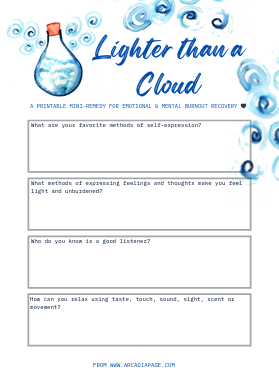As an intuitive introvert, I love spending time immersed in thoughts, ideas, and imagination. I am also emotionally sensitive, honing in on not only the emotional states of others, but also on the ever-changing landscape of my own emotions, even if I don’t fully understand them.
This is where I am the most comfortable, and generally it’s a good place for me. But sometimes, I am overrun with ideas or have to deal with difficult feelings that sap the life out of me. And even worse, the overflowing repetitive thoughts can make it hard for me to rest, although that is what I desperately need.
When I’m like this, I usually need to back off from using introverted feeling and lean more into introverted sensing and the expressive side of extraverted intuition.
Healing Mental Burnout with Extraverted Intuition
INFPs use extraverted intuition, and it comes with two sides. There’s the collecting information side and sharing information side. A lot of the information INFPs tend to collect are about their own emotions. However, collecting all of this emotional information within ourselves and not doing anything with it can lead to feeling overloaded by our own feelings.
Using the expressive side of extraverted intuition can do a lot to let go of pent-up emotional energy and relieve the pressure. Journaling is probably the most accessible way to relieve repetitive thoughts and emotions. I find that once I write the thoughts down, my brain no longer has a reason to keep repeating them.
Journaling in the morning can help with organizing your thoughts for the day. Journaling at night can improve your sleep, especially if you tend to struggle to fall to sleep due to overthinking, such as myself.
If you have other creative outlets in your life, see if you can use those to express what you’re feeling. Visual art, music, crafting, dance, or even an unusual emotive coding project can all be ways to express emotions.
Since INFPs are introverted, we can sometimes be slow to talk to others about our problems. However, talking about the way we feel also involves engaging extraverted intuition, and this can lead to a lot of comfort. This is especially true if the person we’re talking to listens openly to what we’re saying and doesn’t rush to give solutions.
After expressing how I feel, I often feel like a weight is lifted off of me. But although I may feel better from letting go of the thoughts and emotions that were exhausting me, I can still feel a little burned out. Although I may have found emotional relief, my body still feels tired from it all. This is where the use of introverted sensing can help.
Using Introverted Sensing for Recovery
Introverted sensing involves bodily awareness and grounding oneself in the present. So, after expressing all of those feelings, find a way to recharge by getting in touch with your senses or relaxing your body.
Some of my favorite ways to do this are:
- Taking a nap
- Taking a nice, long bath
- Doing gentle exercise
- Listening to music
- Gazing at nature
- Enjoying the scent of a candle
- Enjoy a warm drink
- Taking 10 slow, deep belly breaths
Sometimes the things on this list are good enough, but other times these activities are too chill. I want to relax, but I also want some action. Moments like these are when I slip into what I lovingly call, “Grandmacore Mode.” And no, I’m not talking about grandmas who hang out on Facebook. I’m talking about that sweet, charming tech-free grandma who enjoys doing puzzles and crafts in her free time.
So when I want some relaxation paired with something interesting, I keep the music, the aromatherapy, or the tea, but I also like to add:
- puzzle books
- coloring books
- knitting
Other activities that fit this vibe also include:
- baking
- jig saw puzzles
- weaving
- easy but satisfying chores
So there are a ton of ways to recover from feeling burned out from your thoughts and emotions. All that’s left to decide is, what works best for you?
Just for fun, I’ve also created a printable to go along with this post. Hopefully, it’ll help you to find ways to relieve burnout that fits you.

Download burnoutremedy.pdf